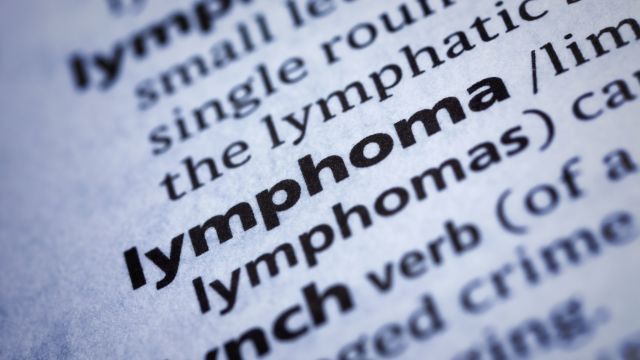If you or someone you love has been diagnosed with a form of lymphoma, you may feel overwhelmed by some of the language used by physicians, as well as that found in medical literature. Here are basic meanings of scientific terms related to this common type of cancer.
Aggressive lymphomas
Lymphomas that grow and spread rapidly. Sometimes called high-grade or intermediate-grade lymphomas, they cause severe symptoms and must be treated as soon as possible.
Allogeneic stem cell transplantation
A procedure during which the patient receives formative (or developing) blood cells from a healthy individual (a donor) who has a similar genetic makeup. The goal is to replace damaged cells. This person could be either a relative or non-relative.
Antibodies
Proteins produced in the immune system that are designed to protect the body from antigens (foreign substances, such as viruses or bacteria, that may cause illness).
Apoptosis
A normal process in which the body rids itself of abnormal cells. Also referred to as “cell death.”
Autologous stem cell transplantation
A procedure during which the patient has their formative (or developing) blood cells collected after diagnosis, stored during treatments and then given back to them to replace damaged cells.
B cells
White blood cells that make antibodies in the immune system that are derived from stem cells in the bone marrow.
Biopsy
The removal of tissue or cells from your body for examination. Incisional biopsies entail taking a small tissue sample, while excisional biopsies involve the cutting away of a problematic area. During a needle biopsy, a tissue sample or fluid is removed. The results of a biopsy can help inform diagnosis and treatment.
CAR-T cell therapy
T cells are white blood cells produced in the immune system that help your body fight off germs. In CAR-T cell therapy, T cells are altered in a lab so they can bind to cancer cells and kill them.
Chemotherapy
A category of medicines designed to treat cancer by destroying cancer cells throughout the body. Also referred to as “chemo.”
Clinical trial
Medical research studies that evaluate the effects of a medical product, behavior or procedure.
First-line treatment
The most accepted type of therapy used to treat a disease. Also referred to as induction therapy, primary therapy and primary treatment.
Hodgkin’s lymphoma
A cancer that originates in the white blood cells (usually in the B cells) within the immune system. Certain abnormal cells called Reed-Sternberg cells will be present.
Immunotherapy
Treatment that boosts or stifles your body’s immune system to help fight cancer. Immunotherapy can be directed toward specific immune cells or the immune system as a whole.
Indolent lymphomas
Also called low-grade lymphomas, indolent lymphomas are slow-growing and slow-spreading lymphomas that tend to cause few or minor symptoms. They may require observation instead of treatment.
Lymph nodes or glands
Kidney bean-sized structures located throughout the body, including your neck, underarm, chest and abdomen. Connected by lymphatic vessels, lymph nodes act as filters for your immune system and contain white blood cells called lymphocytes, as well as other cells related to immunity.
Lymphoma
The most common form of blood cancer located in the lymphatic system—the lymph nodes, spleen, thymus gland and bone marrow.
Lymphocytes
A type of white blood cell found in the immune system. The two main types of lymphocytes are B cells and T cells. A third type is NK cells.
Mantle cell lymphoma
A rare and aggressive form of non-Hodgkin’s lymphoma (NHL) that may affect the lymph nodes, spleen, bone marrow and blood, as well as the gastrointestinal tract.
Metastasis
Cancer cells that have spread from their place of origin by traveling through the blood or lymph system.
Minimal residual disease (MRD)
Minimal traces of cancerous (lymphoma) cells found after a patient receives treatment.
Non-Hodgkin’s lymphoma
A cancer that originates in the white blood cells (usually in the B cells) within the immune system. Abnormal cells named Reed-Sternberg cells are not present.
Oncologist
A doctor who treats cancer. Oncologists can specialize in a particular kind of treatment, such as chemotherapy, immunotherapy, targeted therapy or radiation.
Radiation therapy
A type of high-energy treatment (using X-rays and gamma rays, for example) designed to shrink and destroy cancer cells.
Relapse
When a disease returns after a patient’s condition has improved.
Remission
A reduction or absence of cancer signs and symptoms, often in response to treatment. Remission can be partial or complete. Partial remission is the disappearance of most indications of cancer, while complete remission is total disappearance, though cancer may still be present.
Second-line treatment
A type of treatment used when first-line treatments are not effective or stop being effective.
Staging
A process performed by physicians to figure out how much cancer has spread within your body. Knowing the stage helps determine your course of treatment.
Survival rate
The percentage of people with a particular type of cancer who remain alive for a specific period (often five years) following their diagnosis or start of treatment. Survival rates are not predictive—they don’t project how long you have to live. Instead, they help physicians and patients understand the likelihood of successful treatment.
Targeted therapy
Medicines or substances used to directly destroy cancer cells without harming healthy cells. It is considered a type of chemotherapy, yet will have different side effects than standard chemotherapy.
White blood cells
The type of blood cells found in the blood and lymph tissues that are produced from bone marrow and help the body fight off infections and other diseases.







